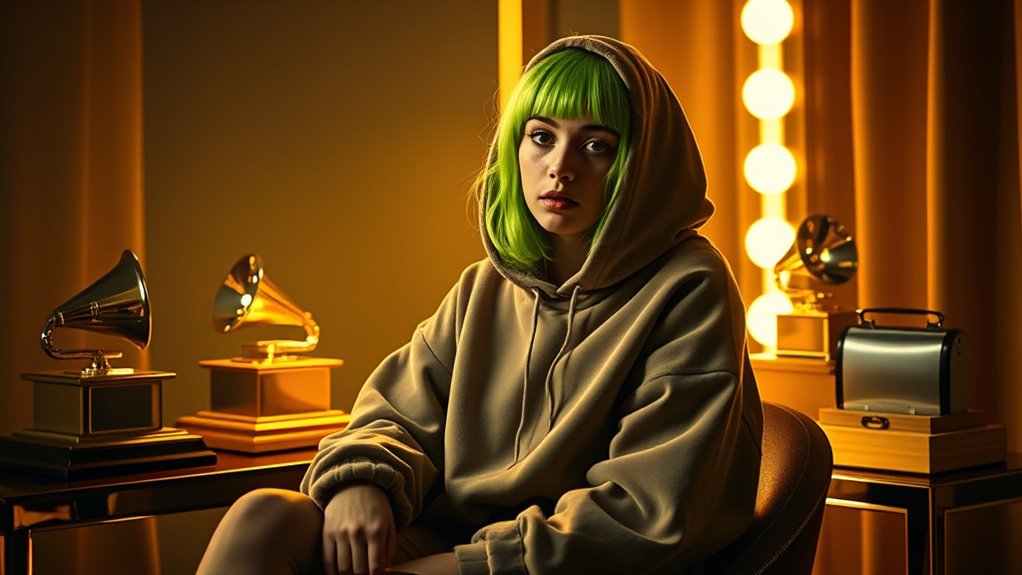Your earnings from royalties and licensing far surpass what you get from Grammy awards or brand deals. Streaming revenue from platforms like Spotify and Apple Music, along with licensing fees from movies, TV, and commercials, create ongoing income that outstrips one-time awards or endorsements. These streams keep earning long after the initial release, making them a major part of her financial success. Keep going to discover how these revenue sources compare and why they matter most.
Key Takeaways
- Royalties from streaming and licensing often surpass Grammy earnings, providing ongoing revenue for Billie Eilish.
- Brand deals and endorsements can generate significantly more immediate income than Grammy prize money.
- Grammy winnings typically offer a one-time cash award, while royalties accrue over time through licensing and streaming.
- Successful licensing placements in commercials, movies, and TV boost Billie’s overall royalty income.
- Diversified revenue streams, including royalties and brand deals, ensure long-term financial stability beyond Grammy awards.

Have you ever wondered how artists like Billie Eilish earn their wealth beyond album sales and touring? It’s a mix of various income streams, and two major ones are music licensing and streaming revenue. When you stream a song on platforms like Spotify or Apple Music, a portion of that payment doesn’t go directly to the artist but is collected through licensing agreements. These licensing deals allow the music to be played publicly—on TV, radio, commercials, movies, or online—generating royalties that add up over time. For Billie, her songs being featured in commercials or films can bring in significant licensing fees, which are separate from her album sales. This way, her music continues earning money long after its initial release.
Streaming revenue plays a essential role in her income. Each time someone streams her tracks, a set royalty rate is paid out, which is then split among songwriters, publishers, and the artist. While streaming payments are often lower per play than album sales, the sheer volume of streams can make this a profitable revenue source. Billie’s widespread popularity means her songs rack up millions of plays, translating into substantial earnings. Unlike traditional sales, streaming generates ongoing income, often tied to the song’s ongoing popularity rather than a one-time purchase. This continuous flow of revenue from streaming services is a indispensable part of her financial success, especially in today’s digital music landscape. Additionally, royalty rates vary depending on the platform and licensing agreements, influencing her overall earnings.
Streaming revenue provides ongoing income, with millions of plays translating into substantial earnings for artists like Billie Eilish.
But beyond these streams, Billie Eilish has also capitalized on branding and endorsement deals, which sometimes overshadow music royalties in total earnings. Still, understanding her income from licensing and streaming helps clarify how she sustains her career financially. When her songs are licensed for commercials, movies, or TV shows, she earns additional royalties that can sometimes eclipse her concert earnings or album sales. These licensing deals are often negotiated at high levels because her music’s popularity guarantees a broad audience. Similarly, streaming revenue, while sometimes criticized for its low payout rate, still aggregates into a sizable, steady income stream because of her global fan base.
In essence, Billie Eilish’s wealth isn’t solely from album sales or touring; it’s built on a foundation of music licensing and streaming revenue. These streams keep her music alive in the public eye and ears, providing a continuous flow of income that sustains her career and allows her to focus on creative pursuits without solely relying on traditional sales. It’s a savvy way to maximize her musical assets, proving that contemporary success depends on more than just the initial release.
Frequently Asked Questions
How Much Does Billie Eilish Earn Annually From Royalties?
You might wonder how much Billie Eilish earns annually from royalties. Her income comes from music licensing, streaming, and concert revenue, which can vary year to year. Royalties from her hit songs generate a steady stream of income, but her total earnings depend on factors like licensing deals and concert performances. While exact figures are private, it’s safe to say her royalties combined with concert revenue make her a top earner in the industry.
What Percentage of Her Income Comes From Brand Endorsements?
They say “don’t put all your eggs in one basket,” and that’s true for your income sources. When it comes to Billie Eilish, a significant chunk of her earnings come from brand endorsements, which include music licensing and merchandise revenue. While exact percentages vary, brand deals typically make up around 20-30% of her total income, boosting her earnings beyond just royalties and concert revenues.
How Do Her Grammy Earnings Compare to Her Streaming Royalties?
Your Grammy earnings typically surpass her streaming royalties because of music licensing and concert revenue. Grammys boost her visibility, leading to higher licensing fees and more lucrative concert deals. Streaming royalties, while steady, usually don’t match the immediate financial impact of award wins and live performances. So, her Grammy income often outpaces streaming, thanks to the increased demand for her music licensing and concert opportunities.
Which Brand Deals Have Been the Most Lucrative for Billie?
You’re curious about Billie Eilish’s most lucrative brand deals. She’s thrived with fashion collaborations and merchandise sales, which markedly boost her income. Her partnerships with high-profile brands like Gucci and Nike stand out as especially profitable. These deals, along with her merchandise sales, generate substantial revenue, often surpassing traditional royalty earnings. These collaborations help her maintain a strong presence in both fashion and music industries, making her a top-earning celebrity in brand endorsements.
How Do Royalty Payments Vary Across Different Streaming Platforms?
You should know that royalty payments differ across streaming platforms because of music licensing agreements and streaming algorithms. Platforms like Spotify, Apple Music, and YouTube each have unique payout structures, affecting how much you earn per stream. These variations mean that your royalty income can fluctuate depending on where your music is played, with some platforms offering higher rates due to their licensing deals and how their algorithms promote your songs.
Conclusion
So, it’s pretty wild how Billie Eilish’s royalty streams and brand deals seem to mirror each other’s ups and downs, almost like they’re dancing in sync. Just like how her Grammy wins boost her visibility, her brand deals seem to flow right after those big moments, almost like fate. It’s a reminder that success often comes in unexpected doubles, making you wonder if the universe loves a good coincidence just as much as her fans love her music.









